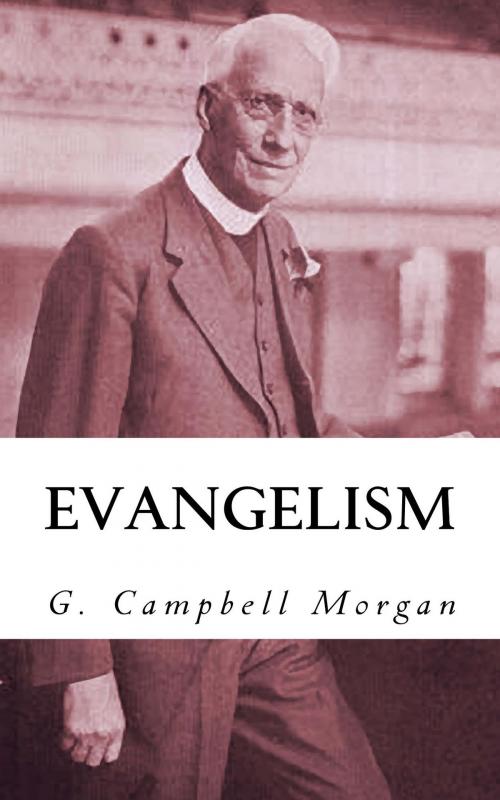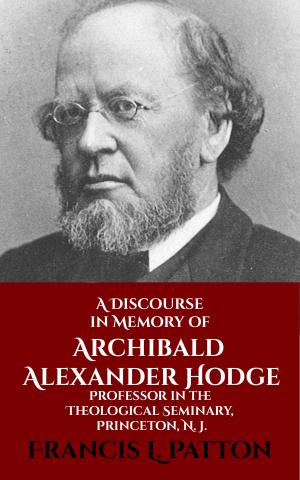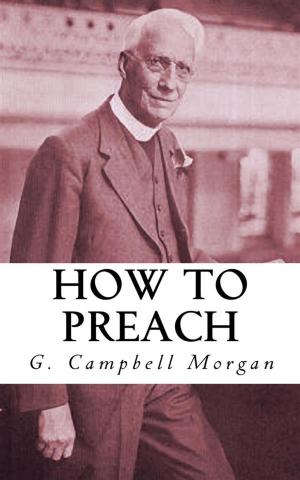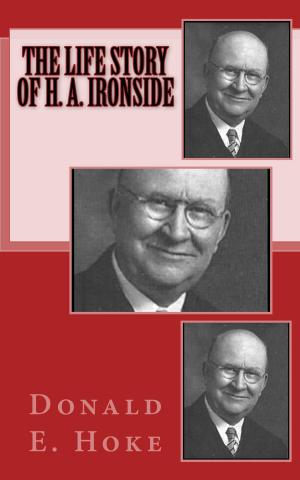| Author: | G. Campbell Morgan | ISBN: | 1230001945188 |
| Publisher: | CrossReach Publications | Publication: | September 30, 2017 |
| Imprint: | Language: | English |
| Author: | G. Campbell Morgan |
| ISBN: | 1230001945188 |
| Publisher: | CrossReach Publications |
| Publication: | September 30, 2017 |
| Imprint: | |
| Language: | English |
The hour is characterized by renewed interest in evangelistic work. Men of all shades of opinion, and men who do not seem to have very profound opinions of any sort, are nevertheless turning their attention towards the great subject of evangelism. I suppose there are a few people in the Christian Church who have no particular interest in the subject. All I can say of such is, that they are living in the mental mood of at least ten years ago.
A new interest in evangelistic work is manifesting itself in different ways. Some people are giving themselves to prayer, that God will give us “an old-fashioned revival.” On the other hand, a great many people, equally devoted and sincere, yet who are out of harmony with what they speak of as the older methods of theological thinking, are nevertheless looking for some visitation. These, instead of praying for an old-fashioned revival are attempting to forecast the lines of what they call “the new evangelism.” Now I do not want to be unkindly critical, for I am profoundly conscious that the underlying fact in each case is of supreme value, but I would never pray for an old-fashioned revival, nor would I attempt to forecast the lines of a new evangelism. But why not pray for an old-fashioned revival? Because I want God’s next new thing. Then why not forecast the lines of a new evangelism? Because one evangel is enough for all time.
If a man is praying for an old-fashioned revival, in all probability when God’s visitation comes, he will not be conscious of it. I can quite imagine how forty years ago, men remembering the marvelous movement under Finney, might have prayed for an old-fashioned revival such as that which accompanied his preaching. Then it is more than likely that when God raised up Dwight Lyman Moody, such men would be out of sympathy with all his methods for a long while, for the notes of the two movements were utterly different. Or to go back still further before the great awakening under Finney, perhaps some prayed for an old-fashioned revival, like that under Wesley and Whitefield. If so, they almost certainly lacked sympathy with the new notes at first.
God fulfills Himself in many ways. In every new awakening there are fresh manifestations of God, new unfoldings of truth meeting the requirements of the age. The evangel is always fresh as the break of day, and yet as old as the continuity of day-break through the ages. We ought to be so living that when God begins His great triumphant march, we shall fall in with the first battalion, and have part in the first victories.
It is equally false to speak of a new evangelism, because there is to be no new evangel. When I read what that very brilliant, and very devoted Christian man, Dr. John Watson, says the lines of the new evangelism are to be, I am in agreement with all he does say, and out of agreement in that there are things he does not say. All he says is true. But there are important things he omits. The next great movement will have within it the notes of the social and the ethical. But there will not be omitted from it the notes of blood redemption, and spiritual regeneration. These are the truths we have to keep in mind. When I hear of men speaking of a new evangelism, it is well to ask their definition of the term evangelism. When I see that Mr. B. Fay Mills has gone out into evangelistic work the first impulse of the heart is to rejoice. But when I find that he is simply preaching a doctrine of a social kingdom, without insistence upon the necessity for regeneration, then it is time we declare our separation.
The hour is characterized by renewed interest in evangelistic work. Men of all shades of opinion, and men who do not seem to have very profound opinions of any sort, are nevertheless turning their attention towards the great subject of evangelism. I suppose there are a few people in the Christian Church who have no particular interest in the subject. All I can say of such is, that they are living in the mental mood of at least ten years ago.
A new interest in evangelistic work is manifesting itself in different ways. Some people are giving themselves to prayer, that God will give us “an old-fashioned revival.” On the other hand, a great many people, equally devoted and sincere, yet who are out of harmony with what they speak of as the older methods of theological thinking, are nevertheless looking for some visitation. These, instead of praying for an old-fashioned revival are attempting to forecast the lines of what they call “the new evangelism.” Now I do not want to be unkindly critical, for I am profoundly conscious that the underlying fact in each case is of supreme value, but I would never pray for an old-fashioned revival, nor would I attempt to forecast the lines of a new evangelism. But why not pray for an old-fashioned revival? Because I want God’s next new thing. Then why not forecast the lines of a new evangelism? Because one evangel is enough for all time.
If a man is praying for an old-fashioned revival, in all probability when God’s visitation comes, he will not be conscious of it. I can quite imagine how forty years ago, men remembering the marvelous movement under Finney, might have prayed for an old-fashioned revival such as that which accompanied his preaching. Then it is more than likely that when God raised up Dwight Lyman Moody, such men would be out of sympathy with all his methods for a long while, for the notes of the two movements were utterly different. Or to go back still further before the great awakening under Finney, perhaps some prayed for an old-fashioned revival, like that under Wesley and Whitefield. If so, they almost certainly lacked sympathy with the new notes at first.
God fulfills Himself in many ways. In every new awakening there are fresh manifestations of God, new unfoldings of truth meeting the requirements of the age. The evangel is always fresh as the break of day, and yet as old as the continuity of day-break through the ages. We ought to be so living that when God begins His great triumphant march, we shall fall in with the first battalion, and have part in the first victories.
It is equally false to speak of a new evangelism, because there is to be no new evangel. When I read what that very brilliant, and very devoted Christian man, Dr. John Watson, says the lines of the new evangelism are to be, I am in agreement with all he does say, and out of agreement in that there are things he does not say. All he says is true. But there are important things he omits. The next great movement will have within it the notes of the social and the ethical. But there will not be omitted from it the notes of blood redemption, and spiritual regeneration. These are the truths we have to keep in mind. When I hear of men speaking of a new evangelism, it is well to ask their definition of the term evangelism. When I see that Mr. B. Fay Mills has gone out into evangelistic work the first impulse of the heart is to rejoice. But when I find that he is simply preaching a doctrine of a social kingdom, without insistence upon the necessity for regeneration, then it is time we declare our separation.















